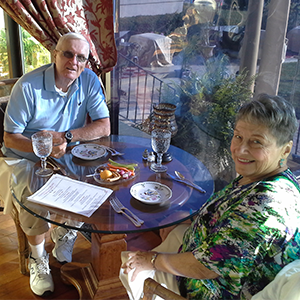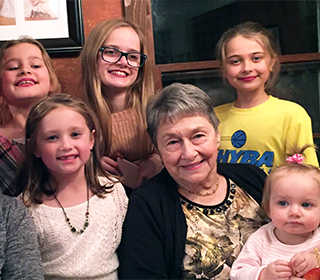The case for colonoscopies: Marge’s story
March 25, 2018
Colonoscopies still the most effective way to catch colorectal cancer

As a spiritual woman, Arlington Heights resident Margaret (Marge) Koperny believes things happen for a reason — even food poisoning. In fact, it was a bout with food poisoning that put her on the path to meet the team of Northwest Community Healthcare (NCH) physicians whom she attributes to saving her life.
Marge, 71, visited one of NCH Medical Group’s internal medicine physician offices during walk-in hours in August 2016 for what she thought was the after effects of food poisoning. After a CT scan and blood test revealed inflammation in her colon, Marge was referred to Benjamin VanCura, M.D., a Board-Certified Gastroenterologist with NCH Medical Group, for an upper and lower GI (gastrointestinal) endoscopy.
During the endoscopy procedure, Dr. VanCura detected a flat polyp, also called a tubular adenoma. He referred her to Willis Parsons, M.D., Medical Director of the NCH Gastroenterology Center, who remarked how impressed he was that Dr. VanCura found the polyp. “He said most doctors would have missed it because of how subtle it was,” says Marge. She was then quickly scheduled for a colonoscopy to have the polyp removed.
“A colonoscopy is considered the gold standard because it is the most effective test for polyps and colon cancer,” remarks Dr. VanCura. “Detecting colon polyps is important because they can be precursors to cancer. Left to their own devices, they can turn into cancer. Another advantage to a colonoscopy is that, unlike other screening tests, you can remove what you see.”
In Marge’s case, the polyp was removed and found to be noncancerous. She scheduled a follow-up colonoscopy in September 2017. It was then she received bad news. A two-millimeter tumor was detected at the site of the polyp previously removed.

Marge was “fast-tracked” and referred to Scott Pinchot, M.D., a Board-Certified Colorectal Surgeon with NCH Medical Group. “About 2 to 10 percent of polyps we remove may harbor a small cancer,” says Dr. Pinchot.
Marge loved Dr. Pinchot’s approach to her care and how generous he was with his time. “He was marvelous. He explained how the colon works, where the tumor was and how the procedure would be performed,” she says.
Marge had a stage I tumor that had no lymph node involvement nor did it penetrate the colon wall.
Dr. Pinchot notes, “The good news for Marge was that with a stage I tumor, oftentimes surgery is considered to be curative. She didn’t need additional treatment like chemotherapy afterwards.”
“I think this stresses the importance of a colonoscopy being able to accurately identify and pick up often what are early stage colorectal cancers,” adds Dr. Pinchot. “It makes a strong case for the role of colonoscopies being able to pick up these tumors before they are symptomatic. Then we have a much better way of being able to manage these postoperatively without needing chemotherapy.”
Marge’s procedure and healing process went smoothly. Dr. Pinchot continues to monitor Marge with blood tests every three months, periodic CT scans and increased surveillance with colonoscopies.
Khriscia McCune, R.N., M.S.N., NCH’s Colorectal Patient Navigator, also met with Marge to provide her with a Survivorship Care Plan, a summary of her cancer treatment and follow-up care recommendations. The plan includes information on health promotion, resources and support available on survivorship.
“The hope is that she lives a good, long life and the cancer never comes back,” says Dr. Pinchot. “Our goal now is to surveil aggressively to make sure that if it ever does come back, we can catch it early.”
For Marge, this experience has only validated her spiritual beliefs, especially when she is under the care of the expert team at NCH Medical Group.
Learn more about NCH’s Digestive Disorders Center and Colorectal Cancer Program.